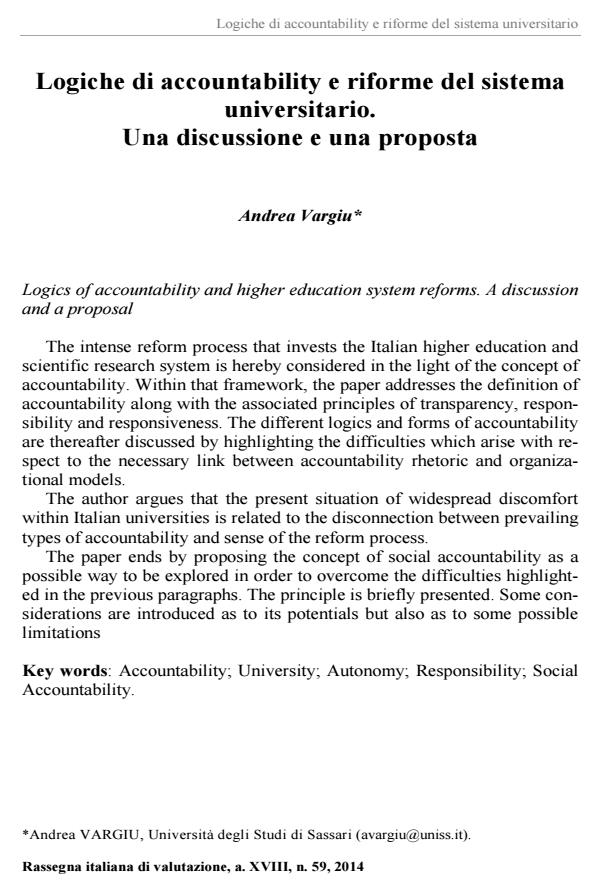Logiche di accountability e riforme del sistema universitario. Una discussione e una proposta
Titolo Rivista RIV Rassegna Italiana di Valutazione
Autori/Curatori Andrea Vargiu
Anno di pubblicazione 2015 Fascicolo 2014/59
Lingua Italiano Numero pagine 19 P. 59-77 Dimensione file 508 KB
DOI 10.3280/RIV2014-059004
Il DOI è il codice a barre della proprietà intellettuale: per saperne di più
clicca qui
Qui sotto puoi vedere in anteprima la prima pagina di questo articolo.
Se questo articolo ti interessa, lo puoi acquistare (e scaricare in formato pdf) seguendo le facili indicazioni per acquistare il download credit. Acquista Download Credits per scaricare questo Articolo in formato PDF

FrancoAngeli è membro della Publishers International Linking Association, Inc (PILA), associazione indipendente e non profit per facilitare (attraverso i servizi tecnologici implementati da CrossRef.org) l’accesso degli studiosi ai contenuti digitali nelle pubblicazioni professionali e scientifiche.
The intense reform process that invests the Italian higher education and scientific research system is hereby considered in the light of the concept of accountability. Within that framework, the paper addresses the definition of accountability along with the associated principles of transparency, responsibility and responsiveness. The different logics and forms of accountability are thereafter discussed by highlighting the difficulties which arise with respect to the necessary link between accountability rhetoric and organizational models. The author argues that the present situation of widespread discomfort within Italian universities is related to the disconnection between prevailing types of accountability and sense of the reform process. The paper ends by proposing the concept of social accountability as a possible way to be explored in order to overcome the difficulties highlighted in the previous paragraphs. The principle is briefly presented. Some considerations are introduced as to its potentials but also as to some possible limitations
Parole chiave:Accountability; University; Autonomy; Responsibility; Social Accountability.
- La valutazione nei progetti contro la povertà educativa: sfide e strategie Valentina Ghibellini, in Community Notebook. People, Education and Welfare in the Society 5.0 5/2025 pp.239
DOI: 10.61007/QdC.2025.3.353
Andrea Vargiu, Logiche di accountability e riforme del sistema universitario. Una discussione e una proposta in "RIV Rassegna Italiana di Valutazione" 59/2014, pp 59-77, DOI: 10.3280/RIV2014-059004